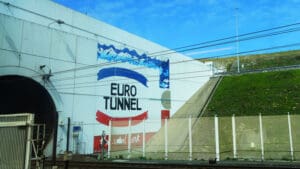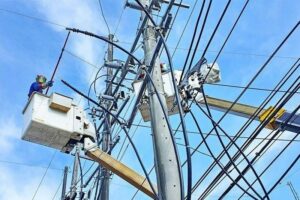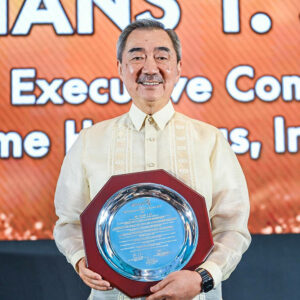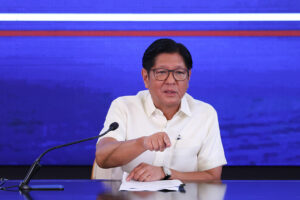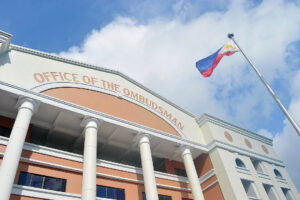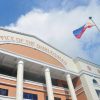By Chloe Mari A. Hufana, Reporter and Erika Mae P. Sinaking
PHILIPPINE President Ferdinand R. Marcos, Jr. said seven people wanted in connection with anomalies in government flood control projects are now under state custody, as his administration seeks to show concrete progress in its widening anti-corruption crackdown.
In a video statement released on Monday, Mr. Marcos said one suspect was arrested by National Bureau of Investigation (NBI) operatives, while six others surrendered to the Philippine National Police’s Criminal Investigation and Detection Group. Two more suspects have signaled that they intend to turn themselves in.
The arrests follow the exposure of a multibillion-peso public works scam that Mr. Marcos discussed in his state of the nation address in July. Public frustration over systemic corruption has deepened in recent months, especially after widespread flooding highlighted years of poor or absent flood-mitigation works.
“There will be no special treatment,” the President said in Filipino, adding that all suspects would remain under NBI custody pending court orders.
He said authorities were tracking down seven more people still at large, including former House Appropriations Committee Chairman Elizaldy S. Co, the most prominent person named in the case.
The country’s anti-graft court issued arrest warrants last week for Mr. Co and 16 others, including the seven who have been taken into custody.
Mr. Marcos said one of the suspects was caught outside their home, and that people who sheltered the fugitive would also face charges. He urged the remaining respondents to surrender, saying they should answer the accusations in court.
The President also warned that anyone helping fugitives evade arrest could be prosecuted for harboring suspects. “We will not stop. We will not hesitate,” he said, adding that the investigation and arrests would proceed until all those covered by warrants have been accounted for.
At a palace briefing, Mr. Marcos brushed aside Mr. Co’s public claim that he received more than P50 billion in kickbacks from infrastructure projects, saying the allegation “means nothing” while Mr. Co remains a fugitive.
He urged the resigned congressman to return to the Philippines and present evidence rather than posting accusations online.
Mr. Co earlier released documents that he said showed deliveries to Mr. Marcos and former Speaker Ferdinand Martin G. Romualdez, the President’s cousin. He claimed he could not return to Manila due to alleged threats to his life and said he believed the administration was preparing to tag him as a terrorist to silence him.
TRANSPARENCY PORTALAlso on Monday, Mr. Marcos introduced a digital transparency platform for public works projects, presenting it as a direct reform measure arising from the flood control scandal.
He said the DPWH (Department of Public Works and Highways) Transparency Portal would give Filipinos real-time access to detailed information on public works projects and serve as the third phase of the government’s response to the controversy.
The first two phases involved identifying “ghost” or defective projects and determining who benefited from alleged kickbacks.
“One of the clearest lessons from this entire episode is that we lost transparency,” Mr. Marcos told the news briefing in Filipino. “These wrongdoers hid their schemes because ordinary citizens — and sometimes, even officials — couldn’t see what was happening inside the government.”
Through the portal, users can search for any DPWH project and view its implementing office, contractor, cost, accomplishment rate, completion timeline and status reports. People can also tag projects as completed, defective, duplicated, unfinished or possibly nonexistent.
The system includes maps, geotagged construction photos, procurement details and downloadable documents such as budgets, bidding schedules and contractor lists. Satellite images provided by the Philippine Space Agency and private partners add an independent layer of verification.
The platform also features an artificial intelligence assistant that can respond to project-specific queries in English or Filipino. It streams DPWH procurement and bidding activities in real time, expanding visibility into a process long criticized for opacity.
“This goes beyond what the [sumbongsapangulo.ph] website can offer,” Mr. Marcos said, referring to the complaint portal he launched in September.
He described the transparency portal as a “digital wall against corruption” and said similar systems are being set up for the Social Security System and Philippine Health Insurance Corp. He said the broader reform push stems directly from the findings of the flood control probe.
“Sunlight is the best medicine,” he said. “Open everything up. People do not trust the system today — and who can blame them? But this is a first step toward restoring confidence.”
Mr. Marcos said the administration would continue rolling out reforms as investigations into irregular projects and collusion between officials and contractors continue.
ICI REFERRALMeanwhile, the Independent Commission for Infrastructure (ICI) has referred Mr. Romualdez’s alleged involvement in irregularities linked to the government’s flood control program to the Office of the Ombudsman for further investigation.
“This referral is issued without any finding or conclusion of guilt or liability on the part of former Speaker Romualdez,” it said in a two-page document submitted to the Ombudsman on Nov. 21 released on Monday. “It is transmitted solely to ensure that all acts, omissions and surrounding circumstances fall within the Ombudsman’s constitutional and statutory authority.”
The referral includes Mr. Romualdez’s Oct. 13 affidavit, the stenographic transcript of his Oct. 14 appearance before the ICI, and video and audio recordings of the proceedings. It also contains an Oct. 24 order from a Manila judge concluding that the affidavit of a former security aide had been falsified.
In a statement, Abdiel Dan Elijah Fajardo, the ex-Speaker’s spokesman, welcomed the commission’s completion of its fact-gathering mandate. “From the outset, we have said that a fair and complete assessment of the record will reflect the truth.”
Jean S. Encinas-Franco, a political science professor at the University of the Philippines-Diliman, said authorities appear cautious, likely because they have yet to build a strong case.
“However, due to strong pressure from various groups, they needed to address Romualdez in a way that allows them to be seen as doing something about his links to the corruption scandal,” she said via Viber.
Antonio A. Ligon, a law and business professor at De La Salle University, said the ICI’s move aligns with the Ombudsman’s authority to investigate government officials suspected of illegal acts.
He said the referral is warranted because the ICI is a fact-finding body, not a prosecutorial one. By elevating the matter, the commission avoids duplication and strengthens institutional legitimacy.
He noted that unlike past ICI referrals involving DPWH officials that led to graft and malversation rulings, the referral on Mr. Romualdez hinges on the same principles but lacks clear evidence of wrongdoing.




